News & Media
Imbizo inspires youth
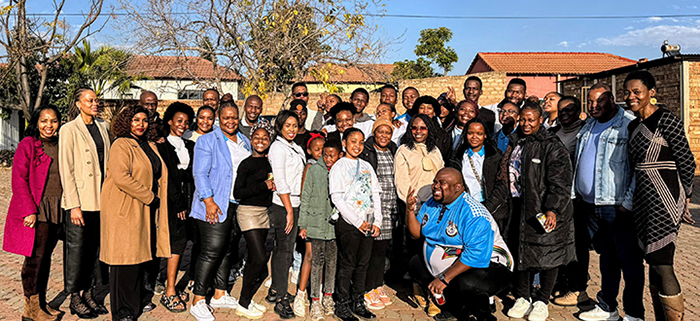
The Unisa Chief Albert Luthuli Research Chair Team with the Mabopane and Mamelodi UCCSA youth
They sang, danced and prayed to hymns that were mending their wounds during the "Let the Youth Say Amen" imbizo, organised by the Chief Albert Luthuli Research Chair. At that point, the youths of the United Congregational Church of South Africa (UCCSA) invoked their higher deity to heed their supplications. Stimulating conversations in the church made the youth feel acknowledged and understood.
On 16 June 2025, the Chief Albert Luthuli Research Chair hosted its annual "Let the Youth Say Amen" imbizo at the UCCSA’s Mabopane congregation, with a focus on addressing the declining participation of young people in South Africa’s mainline churches.
From the start, a spirit of worship prevailed, as the youth of the Mabopane and Mamelodi UCCSA congregations ushered in and welcomed the Research Chair with powerful hymns. Lebang Gaobape, as representative of the Mabopane UCCSA, welcomed everyone, guests in particular, to their congregation. In his address, he reminded the youth that Chief Albert Luthuli, who was a staunch member of the UCCSA, was a man of strong principles and peace.
Prof Puleng Segalo, Incumbent of the Chief Albert Luthuli Research Chair, burst into song, then briefly reflected on the background of the annual imbizo. She mentioned that it all started in 2023 to honour the youth of 1976, who had collectively fought for their identity, their existence and their communities, which were diminishing at the hands of the apartheid government. She appealed to the audience to ensure that the heroism of the 1976 youth should not be in vain, lamenting that in post-apartheid South Africa, political leaders are concerned with the politics of the stomach, rather than Batho Pele (putting people first).
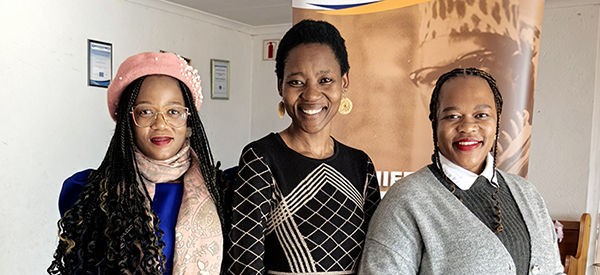
Rinky Modise, Prof Puleng Segalo, and Lulama Ntuta
Segalo conceded that the youth face numerous social ills that hinder their success, and chief amongst these are gender-based violence and mental health challenges. She expressed concern about the high rate of male suicide because of the lack of safe spaces for men to voice the challenges they are facing.
The imbizo featured two key panellists: Rinky Modise, a public health practitioner, and Lulama Ntuta, a healthcare manager and the first vice-president of the South African Council of Churches (SACC). Their views prompted deep reflection and conversations amongst the attending youth.
Modise spoke about the influence of life transitions and traumas on young people’s mental health and wellbeing, arguing that such issues can prevent young people from fulfilling their life purpose. She emphasised that if the church ignores the needs of this cohort, as far as their mental health is concerned, it will be easy for youngsters to lose interest in the church.
She highlighted the myths associated with mental health, amongst others, mental health stigma and the assumption that young people are depressed due to their lack of faith and unconfessed sins. For her, this belief is problematic as it can elicit shame and discourage youngsters from seeking medical assistance. Sadly, few church officials receive mental health-related training and education. Her main request to the church is for it to care and to pour energy into programmes that will assist in healing, caring for and educating the youth, and guiding their parents.
Ntuta was welcomed with the hymn "Matl’a Sona Ke Bophelo" (The power that gives life). Her appeal was that "if only the church would realise its power, it could change the lives of its communities". She reiterated how important it is for the church to profile its members, sitting in the pews, and understand their different dynamics – their ages, geographical location, employment status and aspirations.
For Ntuta, true ministry is achieved when the church truly listens to its people. She criticised the prevailing code of silence and blanket approach to dealing with critical and challenging scriptures that address people’s lived realities. As an example, she noted that churches are silent on scripture dealing with GBV, such as where Tamar was raped by her brother. To combat this, she advocated for a practical faith and action when it comes to people’s lived realities, especially those of the youth. She lamented the fact that the church is quick to pray for the poor and then leave it at that, whilst people go hungry. Lastly, she reminded young people that history has shown the significance of them advocating and fighting for their own place in society and in the church. She pleaded with them to take up space in the church and minister in the ways they know how, to break the silence on issues that are not being talked about.
After a panel discussion, the youth were divided into groups to discuss their takeaways from the thought-provoking views shared by Ntuta and Modise. The young people passionately engaged on various issues that resonated with them. While some groups championed for young people not to lose their identity or forget the principles of the church, the majority felt that the church must move with the times and be transformative, because the current generation is unique and faces diverse yet pressing problems that need to be treated with caution and care. What young people are yearning for, in their view, is to continue having confrontational conversations with the leadership of the church, to ensure that their positions and visibility as church-going youth are not taken for granted.
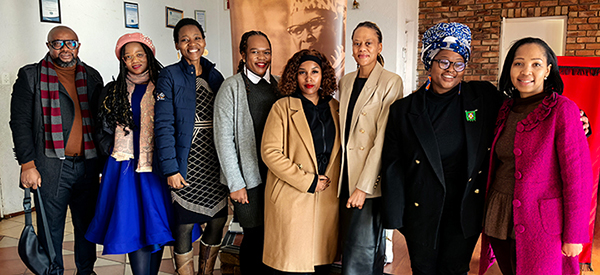
From left: Dr Emmanuel Rowlands (postdoctoral fellow at the Chair), Rinky Modise (public health practitioner), Prof Puleng Segalo (Incumbent of the Chief Albert Luthuli Research Chair), Lulama Ntuta (healthcare manager and first vice-president of the SACC), Lesego Plank (researcher at the Chair), Dr Tinyiko Chauke (senior researcher at the Chair), Mabafokeng Hoeane (researcher at the Chair) and Sindiswa Motsoane (Chair administrator)
Baisiami Disipi, on behalf of the UCCSA Mabopane, thanked the Chair for bringing the imbizo to their congregation. He mentioned that, as a parent and leader in the church, the imbizo had helped him to see the youth in a different light. He pledged to maintain such conversations with the parents, church leadership and youth, in order to gain a more comprehensive understanding of the lived experiences and narratives of its young members.
As part of the programme, the UCCSA Mabopane Children's Ministry, known as the 16 June All Stars, delivered a moving dance rendition, paying homage to the spirit of the 1976 youth. Later, some of the youth members of Mabopane recited a collaborative poem that honoured Inkosi Luthuli and the history of June 16, reminding everyone of the journey we are all on, to ensure that people are truly liberated.
The 2025 youth imbizo reminded the young people that they are not only the church's future but part of its present moment. This means mainline churches should start taking young people seriously by seeking to understand them and their realities. If they remain indifferent, they will bear witness to the demise of traditional churches, as the youth will gravitate towards charismatic denominations that prioritise their needs and invest in their mental health.
* Submitted by the Chief Albert Luthuli Research Chair
Publish date: 2025-07-03 00:00:00.0


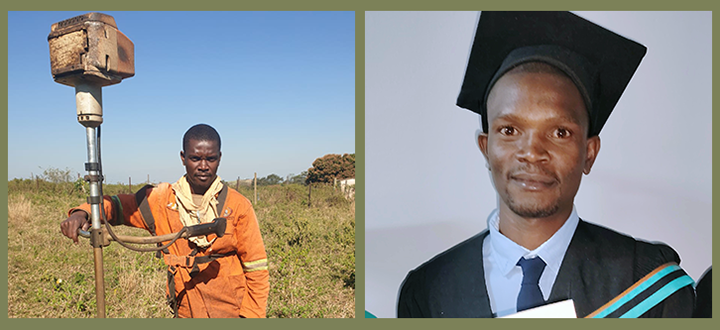 Cutting grass by day, pursuing Unisa studies by night
Cutting grass by day, pursuing Unisa studies by night
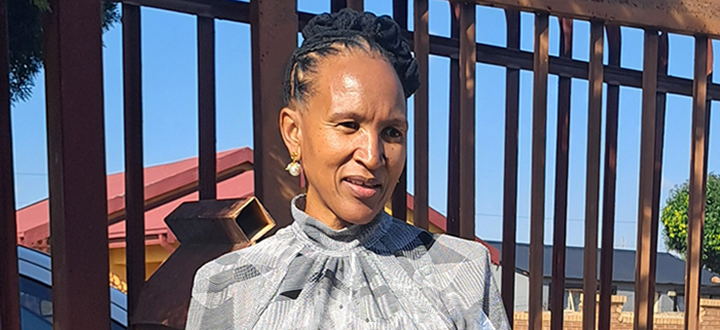 Koma e wetse: When tradition meets the harsh realities of modern livelihoods
Koma e wetse: When tradition meets the harsh realities of modern livelihoods
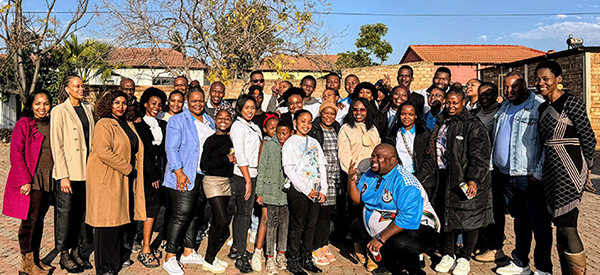 Imbizo inspires youth
Imbizo inspires youth
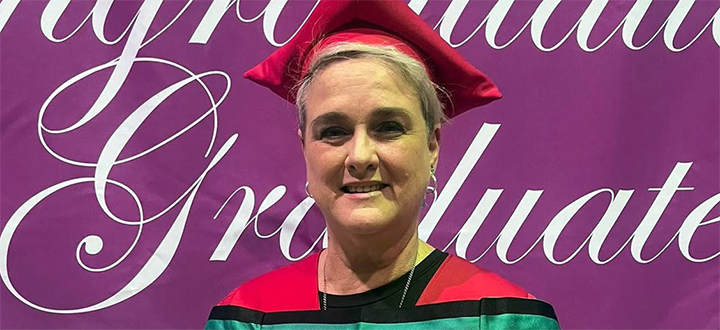 Shedding light on the well-being of ODeL facilitators
Shedding light on the well-being of ODeL facilitators
 A giant leap for student success and retention
A giant leap for student success and retention